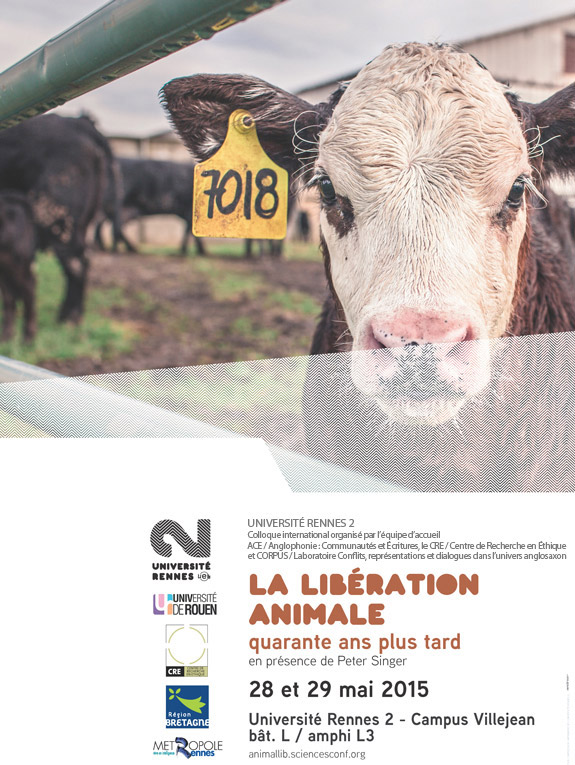[Cliquer ici pour accéder à la version française du site]
The international conference “Animal Liberation, Forty Years on” will be hosted by the Anglophonie : Communautés et Ecritures research team (Université Rennes 2), the Centre de Recherche en Éthique (Université de Montréal) and the CORPUS group (Université de Rouen) on May 28-29 at the University of Rennes 2. The Guest Speakers will be Peter Singer, Lori Gruen, Jean-Yves Goffi, Tatjana Visak (see detailed program).

Download poster
In his book entitled Animal Liberation, utilitarian philosopher Peter Singer elaborates on three main ideas: equality must refer to an equal consideration of interests, whether they are human interests, or the interests of any sentient being; the rejection of speciesism (discrimination based on species’ membership); and the practical consequence of these two ideas, namely the necessity to end certain types of animal exploitation, most notably those related to scientific research and factory farming. This seminal work had a huge impact. So much so that the publication of Animal Liberation in 1975, has been touted as the pivotal moment in the emergence of the eponymous movement. However, the animal liberation movement cannot be reduced to Singer’s thought. On the one hand, it became extremely multifaceted and is now the subject of intense debates - between animal advocates who favour different approaches that lead to incompatible conclusions, as well as between those who seek to improve the lives of animals and those who oppose the animal rights arguments. On the other hand, this movement is substantially shaped by the cultures in which it develops.
The purpose of this conference will be to return to the link between the animal liberation movement and the theories of Peter Singer who, rightly or wrongly, is seen as its founding father. How was Singer’s animal ethics greeted after the publication of Animal Liberation? What feedback did it get from the animal rights movement? What are the conceptual and practical developments of contemporary animal liberation? What place does the utilitarian doctrine and its consequentialist basis occupy in the work of Singer and in the discussion it generated? What are the approaches in animal ethics to which Singer’s publication led?
In anticipation of this meeting, we encourage interdisciplinary confrontation of points of view (Anglophone studies, philosophy, sociology, law, history etc.). We also invite the emergence of a dialogue between different theoretical approaches, such as animal liberation, animal rights, welfarism, critical studies, political views on the status of animals, continental approaches, etc..
Speakers can give their presentation in French or in English, and include a Power Point in their presentation.
The conferences are free and open to all, within the limit of the number of places available. Registrations are now closed. If more people turn up than the lecture hall can accomodate, only those with a valid registration will have access to the premises. Thank you.
Contacts : Emilie Dardenne, Valéry Giroux, Enrique Utria. If you wish to contact us, please use the email address of the colloquium : animallib@sciencesconf.org